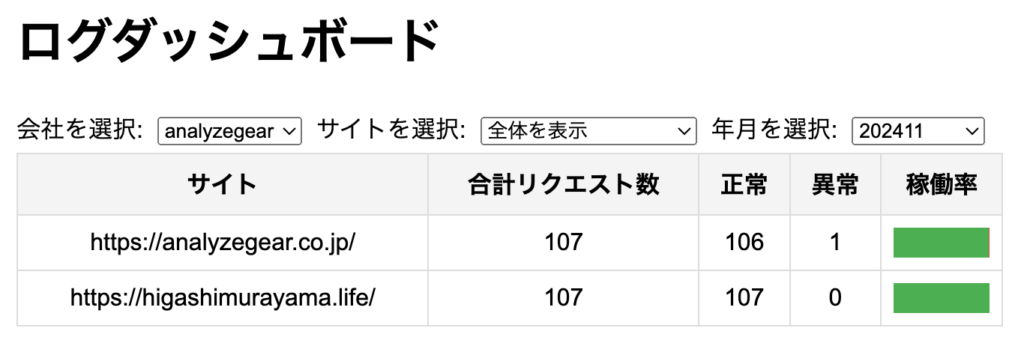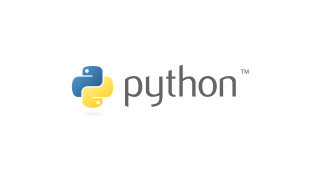本記事では、これまで作成した死活監視スクリプトで取得したログを活用し、過去の監視データを集計・可視化する方法をご紹介します。Flaskを使用したログデータの保存・集計システムと、そのデータを可視化するダッシュボードの構築手順を解説します。
以下の画像は完成したダッシュボードの例です:

使用技術
以下の技術を使用して実装しました:
- Python / Flask: WebアプリケーションとAPIの構築。
- HTML/CSS/JavaScript: ダッシュボードのフロントエンド構築。
- CSV: ログデータの保存形式。
- CGI: FlaskアプリをCGIスクリプトとして実行。
ファイル構成
プロジェクトのディレクトリ構造は以下の通りです:
/site_monitor/
│
├── logs/
│ ├── analyzegear/
│ │ ├── site1/
│ │ │ ├── monitor_results_202411.csv
│ │ │ ├── monitor_results_202410.csv
│ │ │ ...
│ │ ├── site2/
│ │ ├── monitor_results_202411.csv
│ │ ├── monitor_results_202410.csv
│ ...
├── app/
│ ├── main.py # Flaskアプリケーション
│ ├── templates/
│ │ └── index.html # ダッシュボードHTML
│ ├── static/
│ ├── styles.css # カスタムCSS
│ ├── script.js # カスタムJavaScript
│
├── .htaccess # Apache設定ファイル
├── index.cgi # FlaskアプリをCGI経由で実行コード一覧
1. .htaccess
Options +ExecCGI
AddHandler cgi-script .cgi
DirectoryIndex index.cgi
# すべてのリクエストを index.cgi にリダイレクト
RewriteEngine On
RewriteCond %{REQUEST_FILENAME} !-f
RewriteCond %{REQUEST_FILENAME} !-d
RewriteRule ^(.*)$ /index.cgi/$1 [QSA,L]2. index.cgi
#!/home/youruser/miniconda3/envs/flask_env/bin/python
from main import app
import os
# CGI ハンドラー
def cgi_handler():
from wsgiref.handlers import CGIHandler
# Flask アプリケーションをCGI経由で実行
CGIHandler().run(app)
if __name__ == '__main__':
# デバッグ用コードを削除
cgi_handler()3. Flaskアプリ (main.py)
from flask import Flask, jsonify, render_template
import os
import csv
from collections import defaultdict
from datetime import datetime
app = Flask(__name__)
# ログ保存ベースディレクトリ
LOG_DIR = "./logs"
def parse_logs(company=None, site=None, year_month=None):
"""
ログを会社、サイト、年月で絞り込んで集計する
"""
data = defaultdict(lambda: {"total": 0, "success": 0, "failure": 0, "status_codes": defaultdict(int)})
companies = [company] if company else os.listdir(LOG_DIR)
for comp in companies:
company_dir = os.path.join(LOG_DIR, comp)
if not os.path.isdir(company_dir):
continue
site_dirs = [site] if site else os.listdir(company_dir)
for site_dir in site_dirs:
site_path = os.path.join(company_dir, site_dir)
if not os.path.isdir(site_path):
continue
for log_file in os.listdir(site_path):
if log_file.endswith(".csv"):
file_date = log_file.split("_")[-1].replace(".csv", "")
if year_month and not file_date.startswith(year_month):
continue
with open(os.path.join(site_path, log_file), mode="r") as f:
reader = csv.DictReader(f)
for row in reader:
site_url = row["サイト"]
status = row["状態"]
status_code = row["ステータスコード"]
data[site_url]["total"] += 1
if status == "正常に稼働中":
data[site_url]["success"] += 1
else:
data[site_url]["failure"] += 1
data[site_url]["status_codes"][status_code] += 1
return {"logs": data}
def get_site_list(company):
"""
会社内のすべてのサイトを取得
"""
sites = []
company_dir = os.path.join(LOG_DIR, company)
if not os.path.isdir(company_dir):
return sites
for site_dir in os.listdir(company_dir):
site_path = os.path.join(company_dir, site_dir)
if os.path.isdir(site_path):
sites.append(site_dir)
return sites
def get_year_month_list():
"""
ログディレクトリから年月を動的に取得
"""
year_months = set()
for company_dir in os.listdir(LOG_DIR):
company_path = os.path.join(LOG_DIR, company_dir)
if not os.path.isdir(company_path):
continue
for site_dir in os.listdir(company_path):
site_path = os.path.join(company_path, site_dir)
if not os.path.isdir(site_path):
continue
for log_file in os.listdir(site_path):
if log_file.endswith(".csv"):
file_date = log_file.split("_")[-1].replace(".csv", "")
year_months.add(file_date[:6])
return sorted(year_months)
@app.route("/")
def index():
year_months = get_year_month_list()
all_data = parse_logs()
companies = os.listdir(LOG_DIR)
return render_template("index.html", companies=companies, initial_logs=all_data["logs"], year_months=year_months)
@app.route("/api/all")
def api_all():
logs = parse_logs()
return jsonify(logs)
@app.route("/api/<company>")
def api_company(company):
logs = parse_logs(company)
sites = get_site_list(company)
return jsonify({"logs": logs["logs"], "sites": sites})
@app.route("/api/<company>/<site>")
def api_company_site(company, site):
logs = parse_logs(company, site)
return jsonify(logs)
@app.route("/api/<company>/<site>/<year_month>")
def api_company_site_year_month(company, site, year_month):
logs = parse_logs(company, site, year_month)
return jsonify(logs)
@app.route("/api/<company>/<year_month>")
def api_company_year_month(company, year_month):
logs = parse_logs(company=company, year_month=year_month)
return jsonify(logs)
if __name__ == "__main__":
app.run(debug=True)4. HTML (index.html)
<!DOCTYPE html>
<html lang="ja">
<head>
<meta charset="UTF-8">
<meta name="viewport" content="width=device-width, initial-scale=1.0">
<title>ログダッシュボード</title>
<script src="https://cdn.jsdelivr.net/npm/chart.js"></script>
<link rel="stylesheet" href="/static/styles.css">
</head>
<body>
<h1>ログダッシュボード</h1>
<form id="selection-form">
<label for="company">会社を選択:</label>
<select id="company">
<option value="all" selected>全体を表示</option>
{% for company in companies %}
<option value="{{ company }}">{{ company }}</option>
{% endfor %}
</select>
<label for="site">サイトを選択:</label>
<select id="site" disabled>
<option value="all" selected>全体を表示</option>
</select>
<label for="year_month">年月を選択:</label>
<select id="year_month">
<option value="all" selected>全体を表示</option>
{% for year_month in year_months %}
<option value="{{ year_month }}">{{ year_month }}</option>
{% endfor %}
</select>
</form>
<div id="logs-container"></div>
<script src="/static/script.js"></script>
</body>
</html>5. CSS (styles.css)
body {
font-family: Arial, sans-serif;
margin: 20px;
}
table {
width: 100%;
border-collapse: collapse;
margin-bottom: 20px;
}
th, td {
border: 1px solid #ddd;
padding: 8px;
text-align: center;
}
th {
background-color: #f4f4f4;
}
select, button {
margin: 5px;
}
.bar-chart {
height: 20px;
display: flex;
}
.bar-success {
background-color: #4caf50;
}
.bar-failure {
background-color: #f44336;
}6. JavaScript (script.js)
const companySelect = document.getElementById("company");
const siteSelect = document.getElementById("site");
const yearMonthSelect = document.getElementById("year_month");
const logsContainer = document.getElementById("logs-container");
async function fetchData(url) {
const response = await fetch(url);
if (!response.ok) {
console.error("データの取得に失敗しました:", response.status);
return null;
}
return await response.json();
}
async function initialize() {
const allData = await fetchData("/api/all");
if (allData) {
renderLogs(allData.logs);
}
}
function renderLogs(logs) {
logsContainer.innerHTML = `
<table>
<thead>
<tr>
<th>サイト</th>
<th>合計リクエスト数</th>
<th>正常</th>
<th>異常</th>
<th>稼働率</th>
</tr>
</thead>
<tbody>
${Object.entries(logs).map(([site, data]) => {
const successRate = (data.success / data.total) * 100 || 0;
return `
<tr>
<td>${site}</td>
<td>${data.total}</td>
<td>${data.success}</td>
<td>${data.failure}</td>
<td>
<div class="bar-chart">
<div class="bar-success" style="width: ${successRate}%"></div>
<div class="bar-failure" style="width: ${100 - successRate}%"></div>
</div>
</td>
</tr>`;
}).join("")}
</tbody>
</table>
`;
}
companySelect.addEventListener("change", async () => {
const company = companySelect.value;
if (company === "all") {
siteSelect.disabled = true;
yearMonthSelect.disabled = false;
initialize();
return;
}
const data = await fetchData(`/api/${company}`);
if (data) {
renderLogs(data.logs);
siteSelect.innerHTML = '<option value="all" selected>全体を表示</option>';
data.sites.forEach(site => {
siteSelect.innerHTML += `<option value="${site}">${site}</option>`;
});
siteSelect.disabled = false;
}
});
siteSelect.addEventListener("change", async () => {
const company = companySelect.value;
const site = siteSelect.value;
const yearMonth = yearMonthSelect.value;
const url = site === "all"
? `/api/${company}/${yearMonth}`
: `/api/${company}/${site}/${yearMonth}`;
const data = await fetchData(url);
if (data) renderLogs(data.logs);
});
yearMonthSelect.addEventListener("change", async () => {
const company = companySelect.value;
const site = siteSelect.value;
const yearMonth = yearMonthSelect.value;
const url = site === "all"
? `/api/${company}/${yearMonth}`
: `/api/${company}/${site}/${yearMonth}`;
const data = await fetchData(url);
if (data) renderLogs(data.logs);
});
initialize();APIレスポンス例
/api/all
{
"https://example.com/": {
"total": 100,
"success": 98,
"failure": 2,
"status_codes": {
"200": 98,
"500": 2
}
},
"https://analyzegear.co.jp/": {
"total": 120,
"success": 115,
"failure": 5,
"status_codes": {
"200": 115,
"404": 5
}
}
}まとめ
このプロジェクトでは、監視データを効率的に集計・表示できるダッシュボードをFlaskと簡単なHTML/CSS/JavaScriptで構築しました。サーバーの稼働状況をリアルタイムで把握でき、異常検知の迅速な対応に役立ちます。監視システムの改良や、さらに詳細なグラフや通知機能を追加することで、運用の効率化を図ることが可能です。




コメント